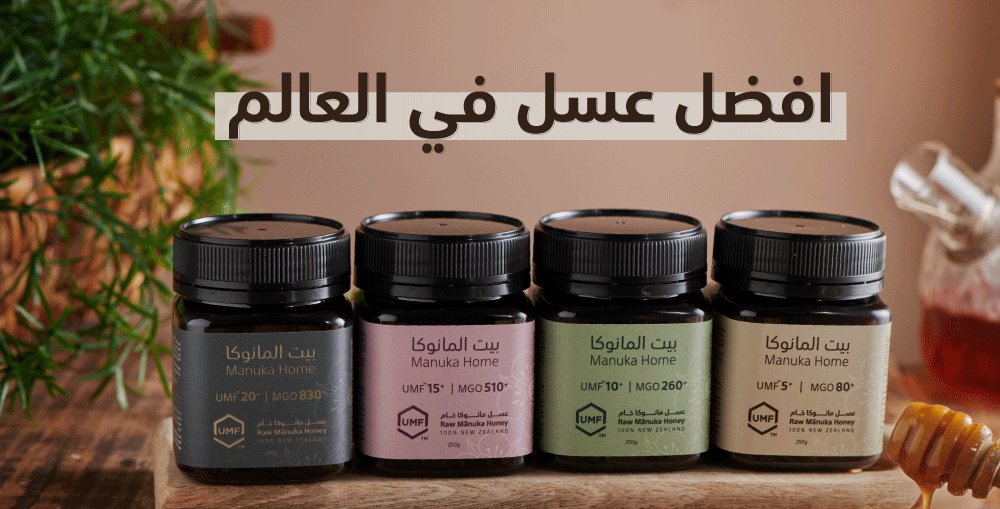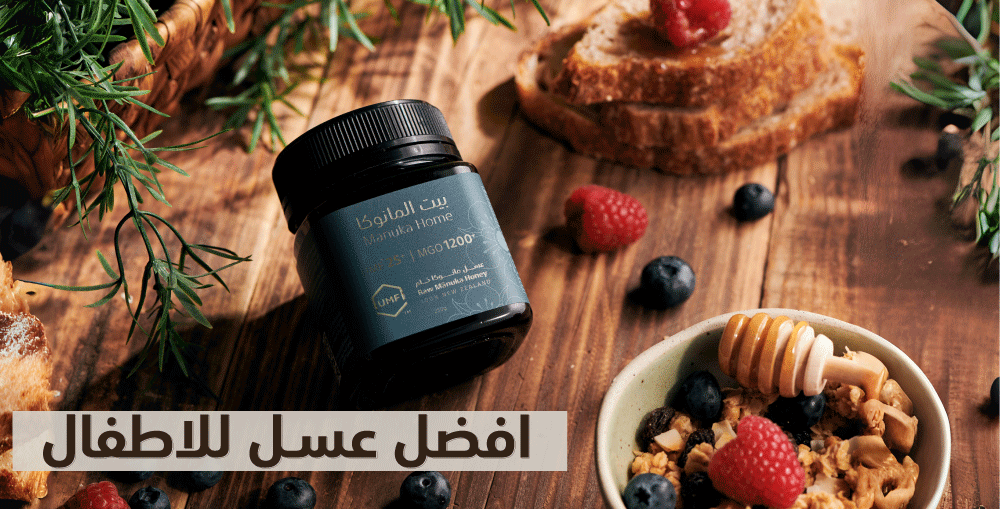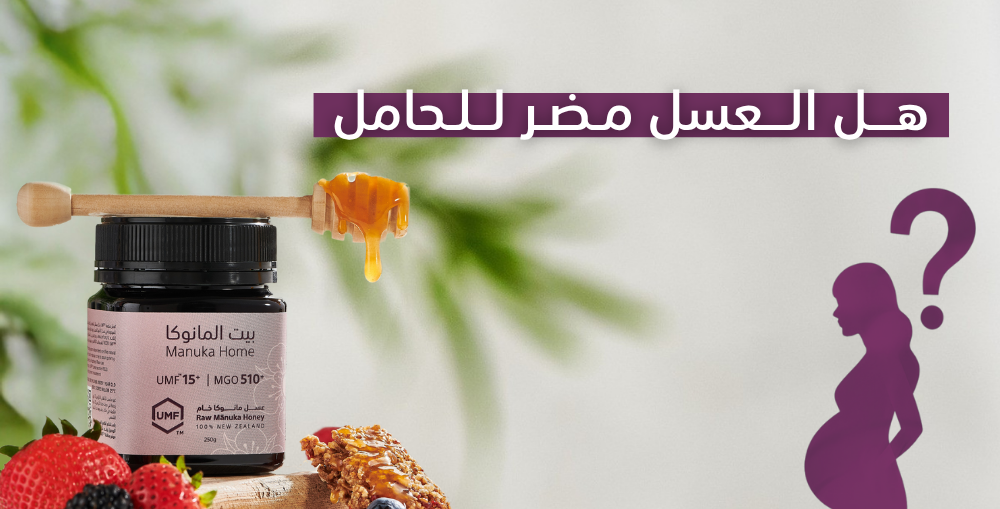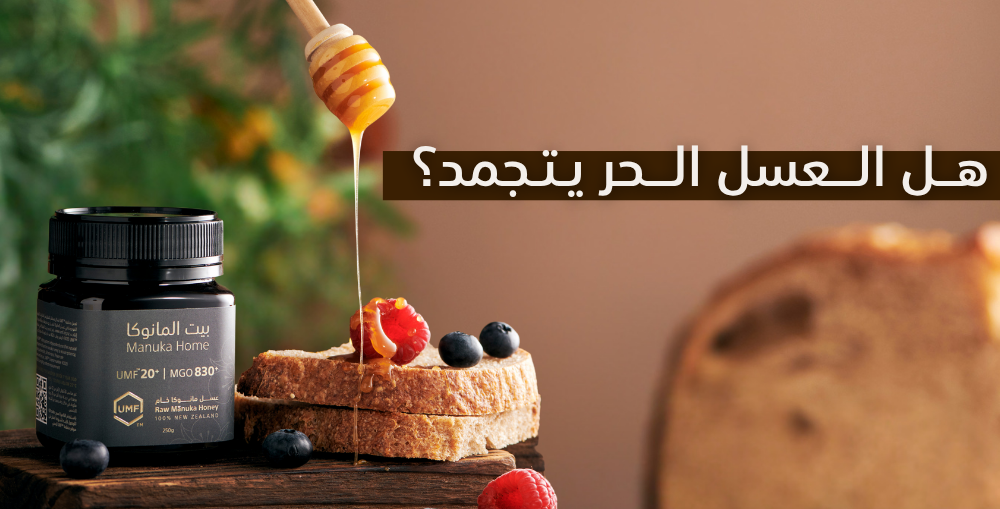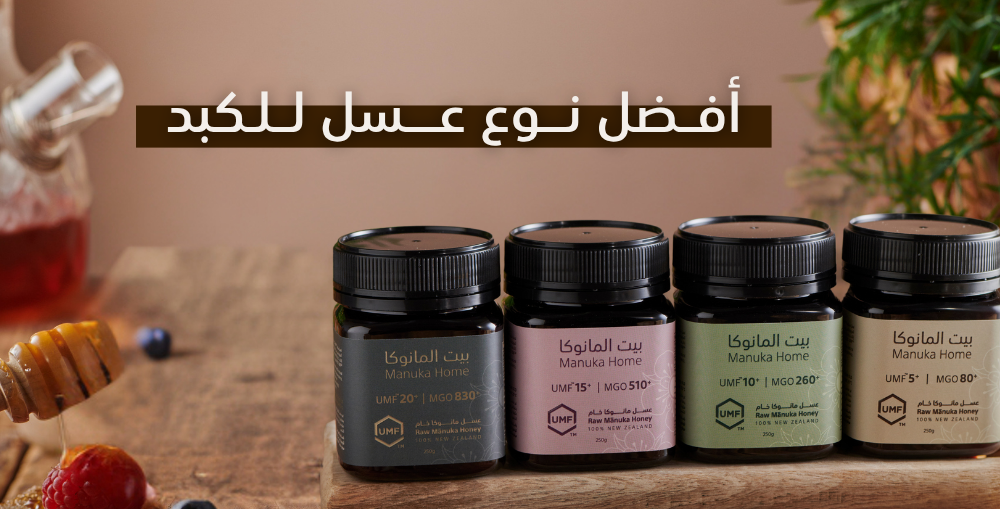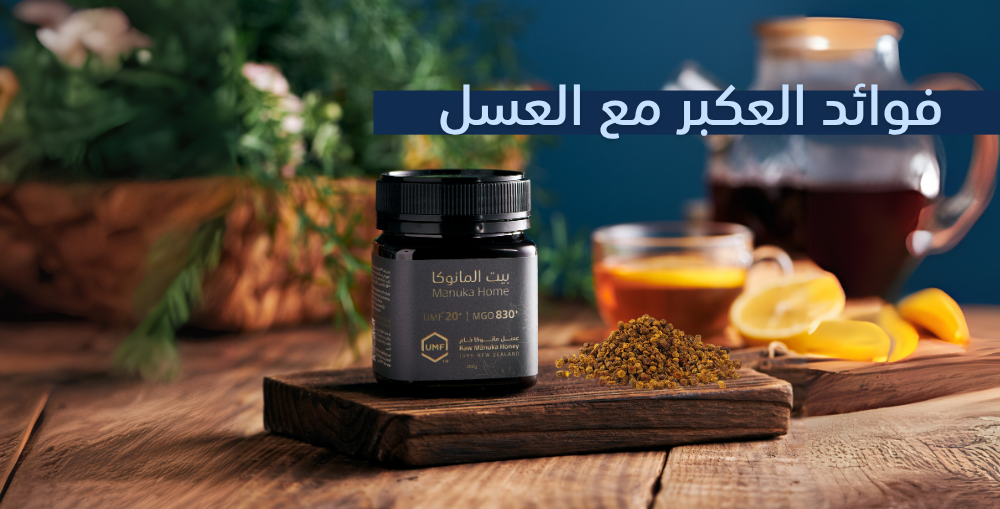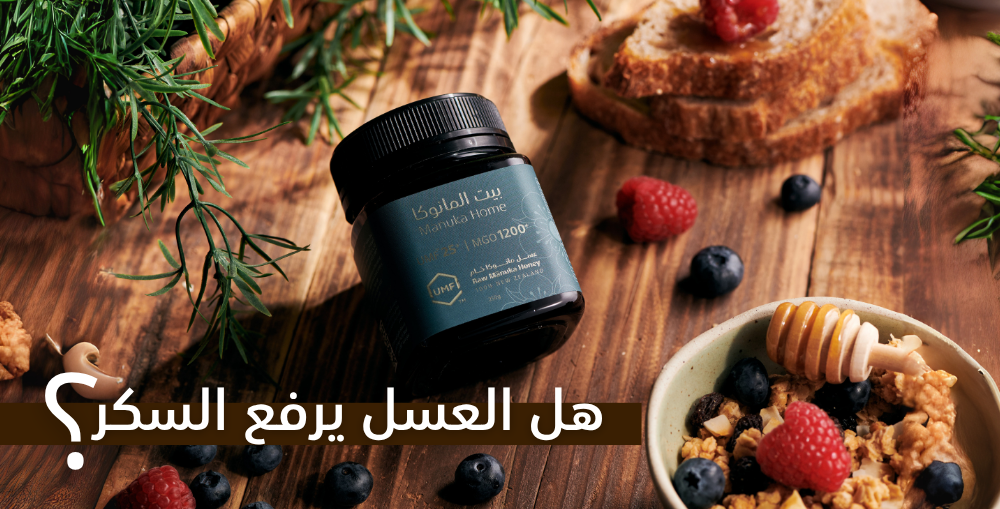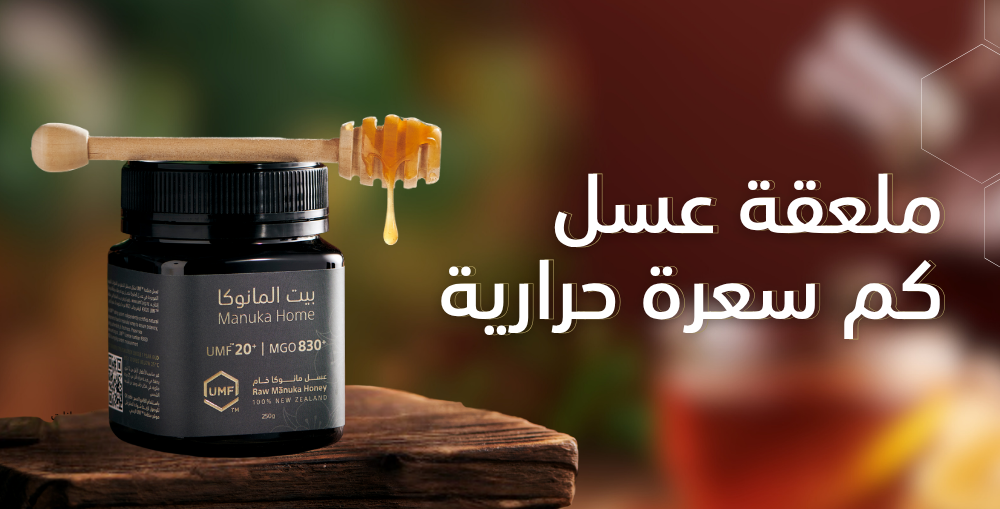Discover the secret of the best honey in the world: unforgettable taste and unparalleled quality.
When we think of honey, we think of that delicious golden liquid that has long been considered a symbol of health and wellness. But have you ever tried the best honey in the world, with its unforgettable quality and taste? Here's our discussion of Manuk honey , a rare natural treasure whose quality and therapeutic value surpass those of all other types of honey.
Thanks to its unique properties and exceptional natural ingredients, Manuka honey has become the best type of original honey and the first choice for anyone looking to boost their health naturally and enjoy an unparalleled, luxurious taste. Let us take you on a journey to discover the secret of this luxurious honey's distinction and why it tops the list of the best natural honeys in the world.
What is the best honey in the world?
Honey is not just a delicious food; it is a natural treasure with unique flavors and properties that vary with the variety of flowers whose nectar bees inhale. When it comes to the best types of honey in the world , personal preferences are intertwined with the unique distinction of each type. In this article, we take you on a journey to discover a selection of the best types of honey for immunity that will captivate your senses with their exceptional taste and rare splendor, including:
1- Manuka honey:
Manuka honey is considered the finest honey in the world, a rare gem in the honey world. It is extracted from the nectar of the Manuka tree flowers, which grow exclusively in a pure natural environment between New Zealand and Australia. What truly distinguishes it is not only its unique source, but also its exceptional therapeutic power, thanks to its active compounds that surpass any other type of honey, making it the best honey in the world .
UMF 20+ Manuka Honey Not just a natural food, it's a luxurious treat that boosts immunity, supports digestive health, and contributes to clear skin, making it the elite choice for anyone seeking superior health and unparalleled quality. Order it now from the Manuka House store and enjoy a delicious taste combined with improved overall health.
What are the benefits of Manuka honey?
Manuka honey contains a huge amount of minerals and vitamins that the body needs. Among the most important benefits of original Manuka honey are:
- It helps relieve gum pain and inflammation, stops bleeding resulting from inflammation, and treats it permanently.
- It improves the digestive system, eliminates harmful bacteria in the stomach, and improves bowel movement.
- It effectively and safely rids the body of stomach bacteria.
- It effectively contributes to treating constipation problems.
- It works to support and strengthen the immune system.
- It is considered the best honey in the world because it acts as an antibacterial shield against bacteria that cause sore throats and sinuses.
Enjoy now a delicious taste with Original Manuka honey supports your health and the health of your family with one spoon every morning. Order it now from the Manuka House store at an exclusive and special price.
2- Sidr honey:
Extracted from the nectar of the samra tree, it is characterized by its dark color and rich flavor, combining sweetness with a slight bitterness. It is ideal for lovers of strong flavors. It is distinguished by its immune-boosting properties and its support for digestive health, making it an excellent choice for daily personal use.
What are the benefits of sidr honey?
- It works to enhance the health of the immune system.
- Supports digestive health efficiently and effectively.
- Suitable for all ages including children.
3- Chestnut honey:
It has a strong flavor and a unique bitter note, making it ideal for those who prefer a deep, distinctive taste. It is rich in natural antioxidants, making it a wonderful supporter of overall health.
What are the benefits of chestnut honey?
- Supports heart health.
- It contributes to strengthening the immune system.
- It adds a luxurious flavor when added to bread or various dishes.
4- White honey
If you're looking for one of the best types of honey in the Kingdom, white honey is a top choice. Thanks to its light color and smooth texture, white honey offers a mild, soothing taste, making it ideal for sweetening hot drinks or enjoying it with breakfast.
What are the benefits of white honey?
- It is known for supporting healthy skin.
- It works to boost energy naturally.
5- Clover honey:
Extracted from the nectar of clover flowers, it is characterized by its light color and sweet, mild flavor. It is therefore one of the best honeys in the world, as it is a wonderful choice for daily sweetening, as an alternative to white sugar, and for preparing desserts. It is also suitable for children, thanks to its pleasant taste and easy digestion.
What are the benefits of clover honey?
- It enhances gut bacteria thanks to its fructose content.
- It protects against iron deficiency diseases such as anemia.
- It is considered a strong diuretic.
- Treats severe cases of diarrhea.
- Improves lung and heart functions.
- It supports respiratory health thanks to its content of a group of phenolic acids.
- It contains a wide range of minerals and vitamins.
6- Sidr honey:
Sidr honey is considered one of the best types of honey for natural treatment and eliminating many digestive problems. It is extracted from the flowers of the Sidr tree and is characterized by its dark color and rich, luxurious taste. It is also known for its powerful properties in supporting immunity and improving respiratory and digestive health. It is the ideal choice for those looking for a unique and unforgettable honey experience.
What are the benefits of Sidr honey?
- It enhances sexual ability in men and increases fertility and sperm count.
- Treats iron deficiency anemia.
- Treats respiratory infections.
- It reduces diabetes problems.
- Treats all problems affecting the digestive system.
- It contributes to the rapid healing of wounds.
- It gives the body energy and vitality.
- It enhances the immune system and the overall health of the body.
7- Talh honey:
Produced from the blossoms of the acacia tree, it boasts a sweet, balanced flavor and a dark color. It's ideal for lovers of authentic, natural honey. It's also one of the best types of honey for married couples, as it's known for its properties in supporting bone health and regulating blood sugar levels, making it a great healthy choice.
What are the benefits of talha honey?
- Reduces the risk of lung cancer.
- It helps sterilize wounds and speeds up their healing.
- It reduces the appearance of acne and makes the skin clear and vibrant.
- Fights aging and annoying fine lines on the skin.
- It enhances concentration, especially for children and the elderly.
- Protects the immune system and supports the overall health of the body.
- Relieves headaches and treats fatigue and stress problems.
8- Acacia honey:
Considered one of the purest and lightest types of honey, thanks to its light color and delicate, sweet taste, it is among the best honeys in the world. It dissolves easily, making it suitable for naturally sweetening drinks or consuming it directly. It is known for its properties in enhancing skin clarity and gently supporting digestive health, and is popular with adults and children alike.
What are the benefits of acacia honey?
- It enhances the inhibition of harmful bacteria that cause many diseases.
- It can be relied upon in the manufacture of many women's cosmetics.
- Helps regulate blood sugar levels.
- Helps facilitate bowel movement.
- It is used in the manufacture of many medicines.
- Completely safe for children and diabetics.
9- Flower honey:
A natural blend of diverse flower nectars, it gives it a multi-dimensional flavor and a unique aromatic scent. It's an ideal choice for those who love fresh, health-boosting flavors. It was prominently featured in Al-Hawaj's "Keep Your Sweetness Natural with Flower Honey" campaign, which inspired thousands of women to replace sugar with natural honey, bringing about a radical, healthy lifestyle change.
What are the benefits of flower honey?
- It effectively contributes to losing excess weight.
- It provides the body with all the elements and vitamins it needs at different age stages.
- Moisturizes the throat and eliminates migraine pain.
- It contributes to improving vision, especially for the elderly.
- It protects many people from developing some skin diseases such as eczema.
What are the best types of honey for men?
Many men are looking for the best honey in the world that will give them health and strength, boost their immune system, and contribute to enhancing sexual health and treating erectile dysfunction . Among the most important types of honey for men are:
1- Eucalyptus honey:
Eucalyptus honey is distinguished by its light yellow color and incomparable fragrant aroma. It is considered one of the best types of honey for married couples, due to its rich nutritional value, including amino acids, proteins, B vitamins, copper, calcium, magnesium, iron, phosphorus, and active phenolic compounds. Among its most important benefits are:
- Enhances sexual ability naturally.
- Stimulates blood flow to the genitals, improving erection and supporting sexual health during intercourse.
- It relieves the body of stress and gives exceptional energy and vitality.
- It contributes to stimulating the ovaries in women and supporting uterine health.
2- Shaflah honey:
Extracted from a winter plant known for its therapeutic properties for thousands of years, it is one of the best types of honey for immunity. Shaflah honey is also a favorite choice in Europe and a source of amazing natural sexual potency. Among its most important benefits are the following:
- It significantly increases sperm count.
- It enhances the health of the reproductive system and urinary tract, making it one of the best honeys in the world.
- Treats erectile dysfunction effectively and safely.
- It contains the compound "Allicin", which improves blood flow to the prostate, in addition to nourishing the liver and kidneys.
3- Royal jelly honey:
Royal jelly is considered one of the best natural treatments for the health of both men and women. It contains a rich blend of B vitamins, folic acid, amino acids, and effective antioxidants. Its most important features include:
- Stimulates sexual desire and increases the quality and number of sperm.
- Treats erectile dysfunction and premature ejaculation problems.
- Improves sexual performance and prolongs intercourse.
- It stimulates the ovaries in women and supports fertility, in addition to enhancing immunity and general health.
What is the best type of honey for sex?
If you are looking for honey suitable for sexual health, here is Manuka Honey Unlimited Energy UMF 20 Package. Considered one of the strongest and best honeys in the world for supporting sexual health and enhancing vital performance for both men and women, Manuka honey is produced from the nectar of the rare Manuka tree flowers in New Zealand by local bees that produce honey of superior purity and nutritional richness. Among its most important features are:
- Boosting libido: Manuka honey raises natural testosterone levels, significantly increasing sexual desire.
- Improves fertility: Supports healthy sperm count and quality, and enhances reproductive capacity with exceptional effectiveness.
- Manuka honey for erection enhancement : It helps stimulate blood circulation to the genitals, leading to stronger erections and longer-lasting sexual intercourse.
Thanks to its natural formula rich in vitamins, minerals, and powerful antioxidants, Manuka honey's effects are not limited to sexual pleasure. It's also the secret to overall health and sustained vitality. Order it now from the Manuka House website and have it delivered to you wherever you are in the Kingdom of Saudi Arabia.
How to choose the best honey in the world?
If you're wondering what the best honey in the world is and are looking for a product that delivers authentic taste and comprehensive health benefits, you should first choose raw, natural honey—one that hasn't undergone any manufacturing or heat treatment that would strip it of its vital properties.
This is like UMF 25 Manuka honey with an MGO concentration of 1200 , which is considered one of the best honeys in the world. The selection criteria are as follows:
- Purity first : Make sure to buy honey that is extracted directly from beehives without any additives or human intervention, to get the highest nutritional value and unparalleled taste.
- Trusted Source : Choosing honey from a trusted brand is a real guarantee of high quality and authentic specifications.
Among the leading names, Manuka honey stands out as an ideal choice for those seeking excellence. It offers pure honey to international standards, combining premium quality with an affordable price, making it the top choice for those seeking a natural honey that is trustworthy and supports overall health.
How do you know the original honey?
Now that we've identified the best honey in the world, we must discuss verifying its quality and authenticity. Many people resort to common tests, such as the water test and the viscosity test, to determine the purity of honey and distinguish it from fake or blended varieties. The following steps can be followed to determine its quality:
- Water test : Place a few drops of honey in a cup of water. Natural honey stays together for a longer period of time without dissolving quickly.
- Viscosity test : Pure honey has a higher density and a firmer texture compared to diluted artificial honey.
However, there's no need for any experimentation or doubt; the Manuka House store offers you 100% natural Manuka honey, extracted from the finest beehives, completely free of any artificial additives or treatments. This offers a unique experience that combines authenticity with a luxurious taste, while ensuring reliable quality and purity in every drop. We have a certified certificate that guarantees you're purchasing an authentic product with a seal on the product itself. Order now.
Frequently Asked Questions
Does the color of honey affect its taste?
Certainly; dark honeys like Sidr and Samra have deeper, richer flavors, while lighter honeys like Clover and Acacia have a smooth, mild taste.
Which types of honey are suitable for preparing desserts?
Clover and acacia honey are ideal for desserts and baked goods thanks to their mild flavor that blends seamlessly with other ingredients.
Which type of honey is suitable for giving as a classy gift?
Manuka honey is a luxurious choice that adds a distinctive touch to gifts, thanks to its exceptional quality and global reputation.
What is the most distinctive type of honey in flavor?
Manuka honey offers an unparalleled rich flavor and is characterized by its strong, intense taste, while acacia honey is an ideal choice for those who love light, delicate flavors.
What is the best type of honey to eat with bread?
Chestnut honey with its strong flavor and Sidr honey with its deep taste pair beautifully with fresh bread to add a luxurious touch to your meal.
What are the best types of honey for daily use?
Manuka honey is a great choice for everyday use thanks to its balanced, mild flavour, and is also suitable for children.
How do I choose the right honey for my taste?
For those who prefer strong flavors: Manuka is best, while for those who like a milder taste, acacia or white honey is recommended.
Where is the best honey in the world?
The best honey in the world is available in the Kingdom of Saudi Arabia at the Manuka House store.
What is the best honey in Saudi Arabia?
The famous Manuka honey, available in various strengths and sizes, is considered the best honey in the Kingdom of Saudi Arabia due to its multiple health benefits.
Which Arab country produces the most honey?
The Kingdom of Saudi Arabia is considered one of the largest honey-producing countries, ranking first in the production of high-quality honey.
Finally, if you are looking for the best honey in the world, you will not find anything better than the famous Manuka honey in the Kingdom of Saudi Arabia due to its countless benefits. It is also at an exclusive and affordable price, and you can get it by ordering it online from the Manuka House store to be delivered to you wherever you are. Order Manuka honey packages now .

